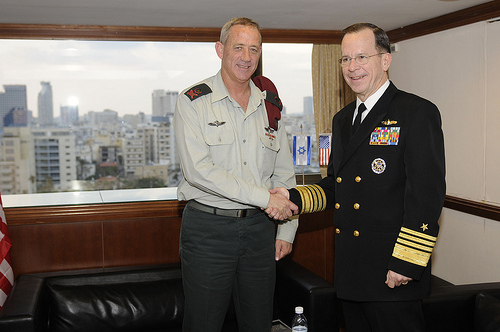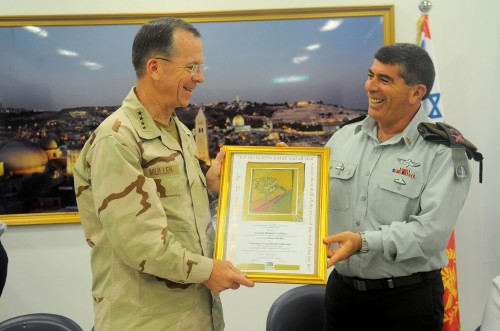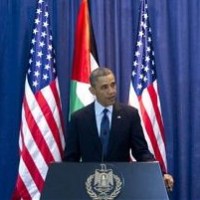![]()
Mon, July 18, 2011 | Debka.com

U.S. Chairman of the Joint Chiefs of Staff, Navy Admiral Mike Mullen (R) meets with IDF Chief of Staff, Maj. Gen. Benny Gantz, Feb. 13, 2011. (Photo: Flickr IDF photostream)
U.S. Adm. Mike Mullen honored for his input in IDF’s war readiness for Iran
Adm. Michael Glenn Mullen is rightly acclaimed as the American military leader who contributed more than any other in the past decade to the depth and breadth of US-Israeli security ties and the Israel’s Defense Forces’ (IDF) preparedness for a potential war with Iran. Adm. Mullen, who retires as Chairman of the US Joint Chiefs of Staff on September 30, arrived Monday, July 18, to take leave of the IDF.
He will be saluted by Chief of staff Lt. Gen. Benny Gantz and a guard of honor of generals when he arrives at General Command Headquarters for a farewell reception.
Adm. Mullen stands out as a warm friend of Israel and firm believer in the military partnership between US and Israeli armed forces as a key component in the national security of both nations — which is why he consistently did what he could to upscale their operational, technological and intelligence ties to an unprecedented level.
None of the world or Middle East events of the past four years altered his appreciation of the IDF as the second strongest Western army after the US armed forces and America’s most reliable military mainstay. Just before he retires he finds this evaluation further strengthened by the poor performance of NATO’s European forces against Muammar Qaddafi in Libya.

US chairman of the Joint Chiefs of Staff Admiral Mike Mullen (L) & Israeli chief of staff Gabi Ashkenazi (R) in Tel Aviv on June 27, 2010. (Photo: IDF)
The top American soldier developed a special relationship with Lt. General Gaby Ashkenazy during the years the latter served as IDF Chief of Staff. Not everyone in Washington or Jerusalem approved of the understandings reached by the two military men in operational matters or their tendency to bypass Defense Secretary Robert Gates, Prime Ministers Ehud Olmert, followed by Binyamin Netanyahu, but most of all Israeli Defense Minister Ehud Barak.
It is important to remember that when Adm. Mullen assumed the top US military post in Oct. 2007, he found Gen. Ashkenazi nine months on the job and in the throes of a major overhaul of Israel’s fighting forces to fix the glaring shortcomings exposed in the 2006 war against the Lebanese Hizballah.
Two months later, in December 2007, the National Intelligence Estimate bombshell was released with the assertion that Iran had put its military nuclear program on ice since 2003.
This estimate was embraced by US President George W. Bush, who was regarded as a friend of Israel (although he later claimed he had not choice in the matter), although its purpose was to freeze the preparations already in train in Israel for strike Iran’s nuclear installations and nipping its progress toward a nuclear bomb in the bud.
The NIE created an awkward moment for Adm. Mullen’s friendship with Israelis leaders. Although he had no hand in the estimate and agreed with Israel that Iran was covertly developing a nuclear bomb which would be used to destroy Israel, he had been tasked with restraining Israel from going to war against the Islamic Republic.
He and Ashkenazi are believed to have tacitly agreed to abide by the Bush administration’s decision to withhold Israel’s military option. At the same time, Mullen decided to make every effort as chairman of the joint chiefs of staff to get the IDF in proper shape for striking Iran at some future point and able to defend Israel against a combined Iranian-Syrian-Hizballah-Hamas war offensive.
This unrecorded pact, concluded during the Bush term, suited the incoming president Barack Obama very well. The IDF was bound by a commitment to refrain from military action against Iran, on the one hand. On the other, the warm ties between the American and Israel top military and intelligence echelons allowed the incoming president to counter-balance his pro-Muslim policies and insistence on confining the nuclear controversy with Iran to the diplomatic track by boasting that as president he had done more than any of his predecessors to guarantee Israel’s military edge against Iran and was dedicated to the Jewish state’s security.
Netanyahu endorsed the “Mullen formula” to refrain from attacking Iran with one difference: He pledged that Israel would not attack Iran without prior notice to the United States.
Mullen initiated seven key steps for tightening relations and boosting Israel’s military muscle:
1. America established in Israel a strong of operational, logistical and intelligence installations and bases unprecedented in size and scale.
2. IDF and home defense systems were integrated in the US anti-missile shield against Iran on land, sea and air.
3. The Israeli Air Force was given permission to use US air bases in East Europe and around the Black Sea in such places as Romania and Bulgaria for operations and training.
4. The US and Israel carried out a series of air and air defense exercises in which American air carriers in the Mediterranean took part.
5. US-Israeli naval collaboration expanded from the Mediterranean to the Red Sea, the Arabian Sea and the Indian Ocean.
6. Regular joint intensive training exercises for US Marines and Israeli Special Operations forces.
7. The IDF and Israel’s weapons, aviation and electronics industries are developing munitions and intelligence systems and methods adaptable to the world combat arenas win which the US is involved.



 RSS
RSS










U.S. Adm. Mike Mullen honored for his input in IDF’s war readiness for #Iran | #Israel #US http://bit.ly/qgOy47
U.S. Adm. Mike Mullen honored for his input in IDF’s war readiness for #Iran | #Israel #US http://bit.ly/qgOy47